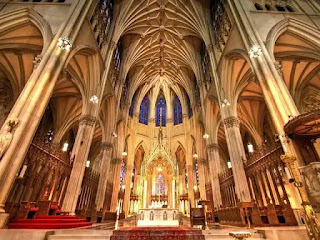Importance of Interlude in Murder in the Cathedral
The sermon as an interlude has not received the critical attention which it deserves. It is very natural and dramatic and is historical. Its emotional value is great, and it is a legitimate dramatic preparation for the episode of murder and martyrdom. Taken as an address to the chorus, it justifies the presence of the women on the stage. Taken as an address to the audience, it establishes an intimate link between the stage and the audience-a link which has a thrill of its own-and it intensifies the religious atmosphere of the stage and auditorium and strengthens Murder in the Cathedral as ‘participation’ drama.
The sermon is an integral part of the play because it explains the significance of the theme of martyrdom. It explains the deep meaning and mystery of our masses of Christmas day’–the mystery of rejoicing and mourning at once. This is truly noble tragic situation-the unison of opposites. The Christian Mass, as Eliot presents it, is a ritual which on this particular occasion combines the Birth of Jesus with his Passion and Death. Murder in the Cathedral is a tragedy and ritual. The sermon explains the Christian idea of peace which is ‘not peace as the world goes’–a message which the Christian world certainly needed in 1935.
“His blood given to buy my life
My blood is given to pay for his death.” (80-81)
The sermon shows clearly that Murder in the Cathedral is ritual drama. The relation between the sermon and the temptation episode is very clear. The conception of martyrdom is a purged version of Becket’s earlier notion. It stresses the idea that martyrdom is the result of the ‘design of God’ and loss of ‘will in the will of god’. The fourth tempter says:
“Seek the way of martyrdom, make yourself the lowest
On earth, to be high in heaven.” (48)
The sermon repeats the idea in almost the same language: “So in Heaven the Saints are most high, having made themselves most low.” It is very easy to interpret Becket’s martyrdom as ‘senseless self-slaughter’. In fact, this view appears more than once. The tempters declare in a choric passage:
“This man is obstinate, blind, intent
On self-destruction.” (50)
The fourth knight’s verdict is: “Suicide while of unsound mind”. (88). It is therefore probable that Eliot means the last part of the sermon to be a restatement in clear prose of what Becket says in his last speech in the temptation episode. Though an address to the public, the sermon is to Becket himself a soliloquy by which he assures himself that he is delivered and that never again will make a mistake because he has now learned how to do the right deed for the right reason.
The sermon is relaxation without a jolt. Its prose has the dignity of restraint and beauty born of simplicity. It has a great emotional appeal which a good actor will easily convey by suitable pauses and by changing the pitch of his voice and giving it a slight tremor at the right moments. Eliot remarks: “A sermon in poetic drama is an exceptional case, but then Murder in the Cathedral is an exceptional play”.
